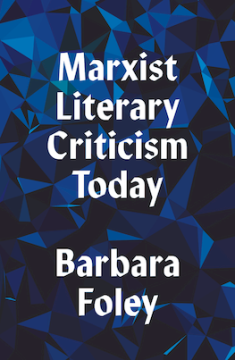
Additional Information
Book Details
Abstract
Why Marxism? Why today? In the first introduction to Marxist literary criticism to be published in decades, Barbara Foley argues that Marxism continues to offer the best framework for exploring the relationship between literature and society.
She lays out in clear terms the principal aspects of Marxist methodology - historical materialism, political economy and ideology critique - as well as key debates, among Marxists and non-Marxists alike, about the nature of literature and the goals of literary criticism and pedagogy.
Foley examines through the empowering lens of Marxism a wide range of texts: from Jane Austen's Pride and Prejudice to E. L. James's Fifty Shades of Grey; from Frederick Douglass's 'What to the Slave Is the Fourth of July?' to Annie Proulx's 'Brokeback Mountain'; from W.B. Yeats's 'The Second Coming' to Claude McKay's 'If We Must Die'.
'Invigorating and lucid - a fine introduction to Marxism in general and to Marxist literary criticism. Foley has done a superb job writing a book that is useful both for novices and for teachers who wish to show how literature is inescapably connected to the material world'
Viet Thanh Nguyen, author of 'The Sympathizer'
'Foley deftly sketches the lineaments of traditional Marxism, then some main interests of traditional criticism, and then shows in readings of literary texts what depth of insight comes from conjoining the two traditions. I warmly recommend this book especially for those who want to change the world as well as interpret it'
Richard Ohmann, Wesleyan University
'Widely surveying contemporary critical theory and practice, Barbara Foley's magisterial book demonstrates the crucial significance of Marxism to our historical moment, and it will be a valuable resource for students, critics, and activists for years to come'
Robert T. Tally Jr., Texas State University
'This is a book many have longed for. Readers of literature will find Foley's lucid exposition of Marxist criticism an invaluable guide.'
Rosemary Hennessy, Rice University
Table of Contents
| Section Title | Page | Action | Price |
|---|---|---|---|
| Cover | Cover | ||
| Contents | v | ||
| Acknowledgements | vii | ||
| Prologue | x | ||
| Part I: Marxism | 1 | ||
| 1. Historical Materialism | 3 | ||
| 2. Political Economy | 33 | ||
| 3. Ideology | 57 | ||
| Part II: Literature | 85 | ||
| 4. Literature and Literary Criticism | 87 | ||
| 5. Marxist Literary Criticism | 122 | ||
| 6. Marxist Pedagogy | 157 | ||
| Notes | 226 | ||
| Bibliography | 228 | ||
| Index | 248 |
